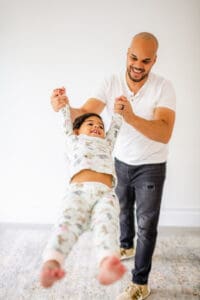What is the best age to sleep train? I’ve gotten this question a lot, as parents of course want what’s best for their little ones.
The most straightforward answer is, whenever you feel like it’s best for your child and family. And I truly believe that!
Though I’d add that there are pros and cons, or favorite and least favorites about sleep training at different ages, so now I’m going to walk through what it looks like to sleep train babies, toddlers, and older kids depending on their age.
Reminder: We Don’t Sleep Train Newborns!
First, just as a reminder, we don’t sleep train newborns. We can absolutely work with newborns and lay a solid sleep foundation that supports their sleep as they continue to get older, whether you choose to sleep train or not, but it’s not official sleep training and we don’t have set goals like we do with older babies and young kids.
If you’re interested in what that newborn sleep foundation looks like, check out our newborn sleep course, Newborn Sleep from A to Z! You can even tag on support if you’re looking for more personalized guidance.
Sleep Training at 4 Months Old
So we can’t sleep train a newborn, but we can start sleep training at four months old! So let’s talk about why four months might be a great time for some families to sleep train, while maybe not a great time for others.

First, let’s talk about the four-month regression – it can be really brutal! It certainly was for us with our oldest. Sometimes newborn sleep is actually pretty great, and all of a sudden that four-month regression hits like a ton of bricks. Other times newborn sleep is already pretty tough, and the four-month regression makes it even harder.
Parents are TIRED! And it’s generally around this time, maybe before, maybe after, that mom and/or dad are going back to work! So it’s a lot.
All of these reasons are both why four months old is a great age for some people to sleep train, and also not a great age for others to sleep train.
For some, you just can’t handle the exhaustion anymore and something needs to change. Four months is a great age to sleep train because if you sleep train your baby now, you’re done! They’re officially sleep trained, and unless something goes really haywire, you shouldn’t really have to “re-sleep train” them – at least for a long long time.
They might go through regressions, which is why we have resources to help you navigate those regressions, but if you sleep train around four months old (which means dropping the pacifier, if you’re working with us!), your baby is now an independent sleeper and that should stick as they keep getting older. And that’s amazing!
On a similar note, while many babies still need one or two night feeds at this age, we can absolutely sleep train around those feedings. And then there is a very good chance that your baby will naturally drop those night feeds as they’re ready, as they have the skills to put themselves back to sleep. Doesn’t that sound pretty great?
For other families, however, four months isn’t a great time to sleep train. Maybe there are too many changes happening right now so you’re waiting (and hoping!) for this sleeplessness to blow over a bit. Additionally, as I just mentioned, many babies still need one or two night feeds at this age, so some families would rather wait until they know their baby can sleep through the night without needing a feed.
Some families also have a tough time wrapping their minds around sleep training a younger baby. They’re simply not ready to sleep train a four-month-old as it seems too daunting or hard. So to those families, I would say it’s not the best time for them.
There are obviously so many other things to consider, like how feeding is going, any health concerns, etc., but these are the big ones that come to mind.
Sleep Training at 6 Months Old
Now let’s talk about sleep training at six months and why that might be ideal or not ideal for some families.
10 weeks of sleeplessness is hard. Four months of sleeplessness is hard. And six months of sleeplessness is HARD! I find that six months is when many parents decide they just can’t keep doing what they’re doing – that something needs to change.
And just to make sure you know, it is absolutely okay and a great reason to sleep train because you can’t handle the sleeplessness anymore. It’s not selfish, it’s wise! We know how important sleep is to both adults and kids, alike, so it’s not selfish to need some sleep back in your life.
Six months is also when babies are super alert and interactive and can be a lot more easily distracted by their surroundings. So it may have once worked really easily to nurse or rock them to sleep, and then transfer them, or simply cuddle them on the couch, but now it’s taking way longer, or they’re having way more false starts, or they’re just getting heavier – so you can’t keep it up!
This is also an age when I’d say most babies are able to sleep through the night without needing a night feed – as long as they’re healthy and growing well, there’s a good chance they’ll be able to sleep through! Or they’re at least very close. So for those families waiting to sleep train until sleeping through is a possibility, we’re here.
Other families again just aren’t ready! This is when most families are introducing solids to their baby, so solids and sleep might feel like too many new things at once. Baby might also be learning to sit up, which can make sleep more frustrating, so again, it just doesn’t feel like the best time.
Sleep Training Babies 7-12 Months Old
Now let’s talk about sleep training babies 7-12 months old.
Again, if six months of sleeplessness can wear on a parent, more than six months of sleeplessness is certainly going to wear on a parent, as well. And at this point, I hear a lot of parents expressing that it’s so clear their baby isn’t getting the sleep they need and they just want what’s best for them.
There is also a very great chance your baby is able to sleep through the night at this point. So again, for those waiting to sleep train until their baby can sleep through, we’re definitely there!
Another big perk about sleep training between 7-12 months old is not only is your baby likely ready for a two-nap schedule, but that two-nap schedule means a consistent, clock-based schedule, which brings a lot of freedom!
One tricky part about sleep training in this window is that a lot of babies are getting mobile at this point. They might have just started sitting up, crawling, or pulling to stand, and that can be tough with sleep, in general. But a lot of parents get nervous to sleep train when they know their baby will sit up or stand up the moment they get in the crib, and they don’t know what to do with that! Or it just makes it feel extra hard.
Some parents are also confused as to how to balance solids and milk, and are nervous about hunger, so it’s just not the best time for them. Again, no right or wrong answer here!

Sleep Training Babies 12-18 Months Old
I’m not going to go into as much detail for our 12-18 month olds, but I do feel like they need an honorable mention. This is a great time to sleep train for the same, “we are so tired and ready” reasons as I’ve mentioned with the other ages.
This is also when many parents are taking the bottle away, and some are weaning from nursing, which are the milestones some parents wait for before sleep training. If there’s no more bottle or no more nursing, they need a different way for their baby to fall asleep!
And I will add that one tricky piece of sleep training in this window that can be extra daunting for some is that the transition to one nap will happen in here, and that can be a tough transition! A lot of parents are unsure of when that transition should happen and how to go about it, and that can be enough to deter them from sleep training.
Sleep Training Toddlers 18 Months-2.5 Years Old
Now let’s talk about the 18-month-olds to the 2.5 year olds – basically toddlers who are ideally in a crib.
If you have a toddler you know they are just different than babies – so when we work with families of toddlers 18 months and older, our sleep plans are now three weeks long instead of two weeks long.
So what makes this a good time to sleep train? Like I’ve said every other time, parents are TIRED! Whether your little one has had challenging sleep from the start, or maybe their sleep was totally fine or manageable until now, I know you’re tired, because toddlers are exhausting!
Another great reason to sleep train in this age range is that your toddler still needs a nap. So if they’ve been rejecting their nap or really fighting it, sleep training them will also get their nap back, which is so helpful for all involved.
Similarly, they are hopefully still in a crib at this point, and the physical boundary of crib rails makes sleep training much easier than waiting for an open bed.
What can make sleep training at this age tougher is that toddlers know how to make their will known and their stamina is a lot higher than that of a baby. So sleep training a younger baby is often easier than sleep training a toddler, simply because of that toddler stamina.
With this will and higher stamina also comes more language. Which I should actually add as a pro, because that means you can also start using more language with your toddler and it can really help them through the sleep training process. But it also means they can use more language or much more clearly reject your language, because they know what they want and it’s not sleep, or it’s not their crib.
Something else that can make sleep training more challenging or daunting for families with toddlers is that nap length, bedtime, and overall sleep needs can vary widely from toddler to toddler, so that can make it tough to feel like you’re really in a solid rhythm.
Sleep Training Young Kids Ages 2.5 Years and Older
Now our last age range will be the toddlers and young kids who are 2.5 years and older, or really kiddos who are no longer in a crib. We work with kiddos up to the age of eight, so I know this is a wide range!
I really want to say kids ages three and up, as we try to keep kids in the crib until at least then, but there are a lot of toddlers who transition to a big bed before the age of three for a variety of reasons, so I wanted to loop them in here.
Sleep training a child who is no longer in a crib is its own world. It’s not necessarily easier or harder than sleep training a little one in a crib, it’s just different! Because those crib railings are a really clear boundary showing a little one where they should sleep. And unless they’re a crib escape artist, they are in that crib, whether they like it or not!
But once we transition a little one to a toddler bed or a big bed, those clear boundaries no longer exist. Sure, they still have a bed, but that doesn’t really mean much to a toddler or young child who doesn’t want to be there.

So you might be co-sleeping right now because it’s the only way of getting any sleep, and you’re ready to have your bed back again. Or you might be walking your kiddo back to their room what feels like 10 times a night because they just won’t stay in bed. Or maybe you have no evening because it’s all spent just getting your little one to stay in bed and actually fall asleep so you can go to bed for the night. And you are ready for them to sleep in their own bed, all night long. Then I would say IT’S TIME!
Sleep training at this age can be tougher because toddlers and young kids very clearly remember what sleep was like before and they are very aware of the changes you’re trying to make now, and they will very likely push back on that. And it often takes even more consistency and for longer because it doesn’t take much for them to try to get back to their former sleeping arrangements, whatever they were.
A reason to not sleep train right now would maybe be that you’re co-sleeping because the constant back and forth just wasn’t worth it to you, and you’re all getting pretty good sleep. When it works for you, it works! Or maybe because of whatever life circumstances, you know you won’t be able to be consistent in following through with a sleep plan for your toddler.
If it’s not a good time, it’s not a good time.
Conclusion
I know this was quite the overview and I’m certainly missing pieces you’re probably considering, but hopefully this is helpful for you to think about what might be best for your family! I also didn’t begin to go into other logistical reasons for when to sleep train, like sickness, travel, moving, or having another baby, so if you’re looking for more considerations, check out this blog post.
So again, what’s the best age to sleep train? The answer is, IT DEPENDS! It doesn’t depend on when your friend sleep trained, or when your mom says you should sleep train, it depends on what is best for your baby and your family – and that will look different for everybody!
Sleep training is possible for babies and young kids four months and older, and there is no such thing as being “too old to sleep train.” Sleep is always possible!
So that’s the whole goal of this post. To first take away any pressure of “You have to sleep train at this age.” And to also help you think through when might be the best time for your child and family, if sleep training is the route you want to go.
Also rememeber that you don’t have to sleep train at a set age or in a set way. And you may waffle back and forth for a bit not knowing if it’s the right time, or being nervous or unsure. And that’s okay!
And you know what? Not everybody needs to sleep train or wants to sleep train! The whole point here is to remember that you get to decide what’s best for you and your family.
If you are ready to sleep train, or are just looking to learn more, know that we have so many resources to support you on your sleep training journey, whatever it may look like and whenever it happens! That’s what this podcast and blog are for, that’s why we’re active on Instagram, and it’s what our online sleep classes are for – to teach everything you need to know about your little one’s sleep, whether you’re sleep training or not.
We also work with families one-on-one to personalize sleep plans and support them through their sleep training journey, because it can be hard! We want to navigate all of those “what-ifs” and “what-nows” with you so you don’t have to do it on your own. And we want you to feel confident and to see success.
Finally, if you have any questions about what it might look like to work together or what sleep training might look like for your little one, book a (free!) 20-minute discovery call so we can learn more about what sleep currently looks like for you and then share how we can help!
With Grace,
Lauren